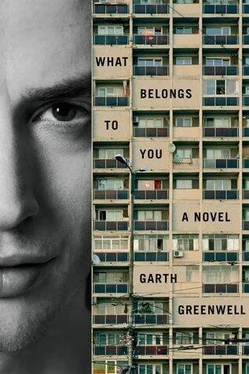That morning I spent grading papers was almost two months after my final meeting with Mitko in Varna, a meeting that was itself preceded by three months of silence. In the days and weeks that followed the night we spent together in Mladost, one of only two nights, as it turned out, we would spend together in all the months we knew each other, Mitko appeared at my apartment every few days, always friendly and eager, and always with some request. Whenever I heard the ringing of the bell linked to the street entrance, which no one else ever rang, I felt torn between a desire on the one hand for the routines of solitude (my writing and my books); and, on the other, for the thrill of Mitko’s presence and its disruption of all routine. But after weeks of these visits I’d had enough disruption, and I came to resent the requests he made, which were never exorbitant (money for cigarettes or credit for his phone, once forty leva for a pair of shoes), but which it seemed would never end. Still, on the very evening I put a stop to these visits, my heart leapt up as it always did at the buzzer’s announcement of his presence. He was friendly when I opened the door and seemed well enough, but I was worried by the state of him; his clothes, about which he was usually so fastidious, were dirty, and as he walked past me I could smell it had been days since he had bathed. We had just sat down on the couch, he had just smiled at me in invitation and I had laid my head on his chest, inhaling his sour smell, when there was a knock at the door. I had forgotten about my dinner with C., a friend who lived on the floor above me and also taught at the American College; he had come to pick me up on the way to a restaurant nearby. Mitko was delighted to see this friend, whom he had met before on one of his visits and with whom he was clearly smitten, as was nearly everyone who met C., who had an effortless, ingratiating charm and was nonetheless entirely indifferent to the needs and desires of others, so that he seemed always to be receding while still inviting pursuit. Mitko hardly took his eyes off him and touched him whenever he could, always robust and friendly touches, a physical language he used to compensate for their inability to speak to each other; and yet touches that, though there was nothing at all seductive about them, I knew would at the slightest sign of permission or desire have taken on a sexual heat.
At dinner, Mitko ordered far more than he could consume, as he always did, food and drink and cigarettes. I was soon exhausted by my attempts to translate, and we settled into a silence interrupted by Mitko’s sallies at conversation, nearly all of them directed, through me, to C. Maybe it was out of jealousy, then, that I suddenly asked Mitko whether he liked his life among his priyateli , putting the question as baldly as that. Ne , he answered with the same bluntness, showing his usual reticence to discuss anything unpleasant, especially about his past or how he had reached his present. I pressed him, unsure whether I was motivated by cruelty or interest or concern, and, entirely neglecting my friend, who was unable to follow even my halting Bulgarian, I asked Mitko why then he chose to live as he did. I knew the question was naïve, or not even that; it was unfair, it presumed a freedom of choice that implied a judgment I had no business making. Sudba , Mitko said, fate, the single word serving to dismiss at a stroke all choice and consequence. In Varna there were no jobs, he said, and in Sofia what jobs there were were shut off to him, since he had no address he could give to employers, and no way to get an address without work. This was the end of our exchange, which colored the remainder of the evening, for the rest of which there would be no more innuendo from Mitko (innuendo that I had received ambivalently, to his visible confusion) and during which in other respects as well his mood was subdued, as was my own. At one and the same time, I wanted to repair the damage I had done and sensed with relief the possibility of extricating myself from an entanglement that had become more intricate than I could bear. It seemed to me there was no attitude toward Mitko I could take that would let me be at once sufficiently compassionate and sufficiently free, so that I wavered between eagerness and distance, an ambivalence that I knew, though it was especially acute with Mitko, characterized all of my relationships, casual and profound. When we stood up from the table, I told Mitko I would walk with him to the metro, making clear that this once, at least, we wouldn’t be having sex. I was relieved to make this clear, to find I was able to make it clear, but I still didn’t feel at ease with myself or with him, and the mood was heavy as we walked. I had asked C. to come too; I thought he would help my resolve, and I didn’t want to be alone when I saw Mitko off, but he kept his distance, walking a few steps behind us. Finally I asked Mitko if he was all right, unable to bear his silence anymore. He looked away from me, toward the traffic on the boulevard, and said Iskam da zhiveya normalno , I want to live a normal life. I was silent for a moment, torn between a terrible sadness and my desire for escape. And then, watching his face, I don’t want to be one of your clients, I said. He turned to me in surprise, saying But you aren’t a client, you’re a friend, but I waved this objection away. I like you too much, I said, clumsily but with candor, it isn’t good for me to like you so much. We had reached the station by then, and he stood a moment looking at me with bemusement, not quite sure what to make of what I had said, and perhaps wondering which of the faces I had shown him was the true face, the face of need he had been accustomed to, or this new face that suddenly was closed to him. Then, as if deciding it wasn’t worth his while to understand, he shrugged and put out his hand, asking for a ten-leva note to see him on his way.
For three months there was no sign of Mitko, and over the course of that time my surprise that he would take my parting words to him seriously turned to concern and finally, inevitably, to longing. It was on a weekend afternoon late in February that with a ping he appeared on Skype, from which he had been absent all that time, as he had been absent from NDK and from the streets I had begun to haunt in the hope of finding him again and of picking up the thread I had (as it seemed to me now) too quickly and with too little thought let drop. How extraordinary that with the press of a key, allowing no time for regret, my screen should be filled with his moving image, dear to me again after the long absence. He was peering at his own screen, his face, at first knit with attention, suddenly relaxing and coming alive, as he smiled with what seemed a genuine smile at seeing me after all this time. As we spoke, I stared at his image as if to consume it, taking in what I was surprised to find I had nearly forgotten, though he had let me take photographs of him that night we spent in my apartment, dozens of them, and I had looked at them often in the months he had been gone. But now I could see how he moved, the gestures he made that were too swift for photographs, the living tale of him, and I was filled with a longing free of all ambivalence. He looked better than the last time I had seen him, his clothes were clean, his head freshly shaved, so it was a shock to learn that he had spent the last ten or so weeks in a hospital in Varna, laid up with a liver disorder of some kind. I couldn’t make out the details, either because of my Bulgarian or because he shied away from telling me too much. He did speak of the terrible boredom he felt in the hospital, where he was confined to a bed, without a computer or even a television for distraction, since the one mounted in his room would only play if fed constantly with coins. Nor were books or magazines a diversion, since he read Cyrillic with difficulty; he had left school in the seventh grade, and was more comfortable with the Latin characters used in Internet chat rooms. He confessed this to me with evident shame one day when I had run out briefly for something he wanted — cigarettes or alcohol or the sweets he loved — and returned to find him at the computer moaning with frustration, unable either to type in the Cyrillic script it was set to or to switch it back. His only visitors had been his mother and grandmother and the boy he called brat mi , whom I hadn’t seen since that first day at NDK.
Читать дальше












